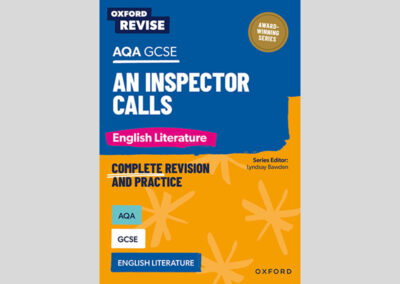Oxford Revise: AQA GCSE English Literature: An Inspector Calls Glossary
The key vocabulary you need to learn for your AQA GCSE English Literature: An Inspector Calls paper. Find all the terms and definitions you need to understand, from ‘attitude’ to ‘turning point’.
A (attitude to audience)
attitude
An attitude is the way someone thinks or feels about something.
audience
The audience of a text means the people who will read it, or at whom it is aimed; for example, teenagers.
C (cliffhanger to convey)
cliffhanger
A cliffhanger is an ending to a chapter or section of a narrative which leaves the reader anxious to know what will happen next.
climax
The climax of a narrative is the point of greatest excitement.
complications
Complications are additional revelations or actions which increase the intensity of the drama.
conflict
Conflict is a dramatic device which prevents a character from achieving their goal by introducing disagreement, such as a problem or struggle.
convey
To convey a meaning or idea is to express it so it can be understood by a reader.
D (dialect to dramatic irony)
dialect
A dialect is a form of language, based on grammar and vocabulary, spoken in a particular region.
dialogue
The word ‘dialogue’ refers to the words spoken by two or more characters in a story. It can also include other phrases around these words, such as ‘she said’.
didactic
Didactic means something that is designed to teach or instruct.
dramatic irony
Dramatic irony is when the words or action of the play are understood by the audience but not by one or more of the characters on stage.
E - G (emotive language to genre)
emotive language
Emotive language is the use of words chosen to have an emotional effect on the reader.
empathy
Empathy is the ability to understand how someone else may be feeling, or to imagine what it might be like to be another person.
explicit
An explicit statement is one that plainly states a fact or viewpoint, rather than just hinting.
foreshadowing
Foreshadowing is the fiction technique of making the reader anticipate events that will happen later, as in: ‘If I had known then, I might not have done what I did next.’
genre
The genre of a text is its broad category, such as horror story, romance, or travelogue.
I - M (inciting incident to microcosm)
inciting incident
In a novel or play, the inciting incident is an event early in the narrative that triggers the main action.
metaphor
A metaphor brings something to life imaginatively by speaking of something as if it is something else that it resembles in some way, without using ‘like’ or ‘as’.
method
A method is a way of doing something.
microcosm
A microcosm is a small place or community which could be considered to represent a much larger place or society, such as a small village containing all the obvious qualities of a large country.
P - R (patriarch to rising action)
patriarch
A patriarch is the male leader of a group, who typically would expect to have power and be respected.
plot
The plot is the story or sequence of events of a play or other work of fiction.
rhetorical question
A rhetorical question is one asked for dramatic effect, without expecting an answer.
rising action
Rising action refers to additional revelations or actions which increase the intensity of the drama.
S (slang to subtext)
slang
Slang is very informal language, often shared by people of similar ages, backgrounds, or occupations.
stage direction
The stage direction consists of the words the playwright uses that are not dialogue, which help the reader to imagine the play. These might describe what the set and costumes look like, when the characters move, or how a line should be said.
status
Status is social position or rank in relation to others.
structure
The structure of a text is how its parts relate to each other to make a whole.
subtext
The subtext is the meaning beneath a line which isn’t openly expressed in the words themselves.
T (tension to turning point)
tension
Tension in a text can refer to the sense of conflict between characters or the feeling of anxiety generated in readers about the text’s outcome. In most fictional texts the tension is ultimately resolved, though not necessarily by a happy ending.
turning point
The turning point in a story is an event that changes the direction of the story.
